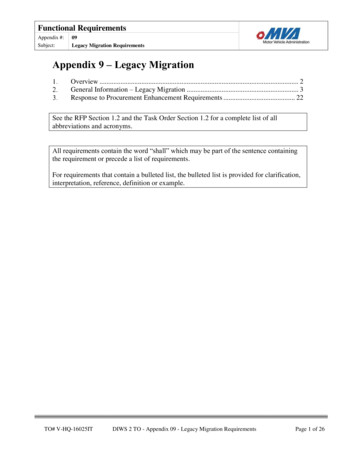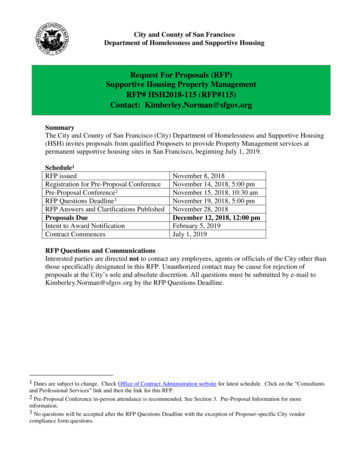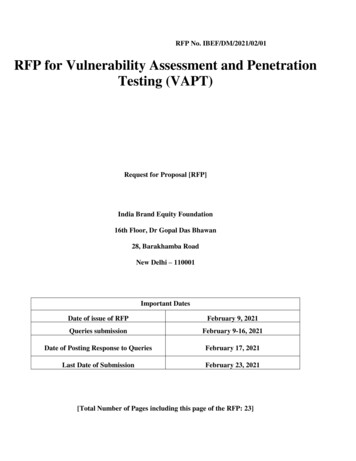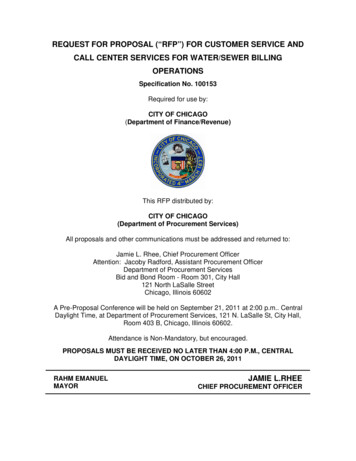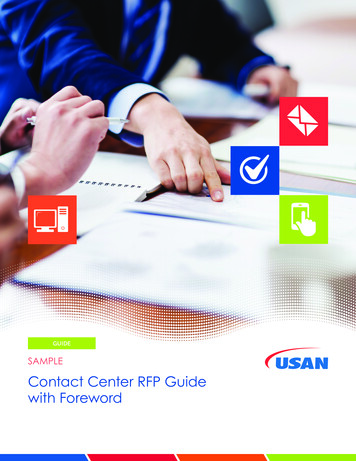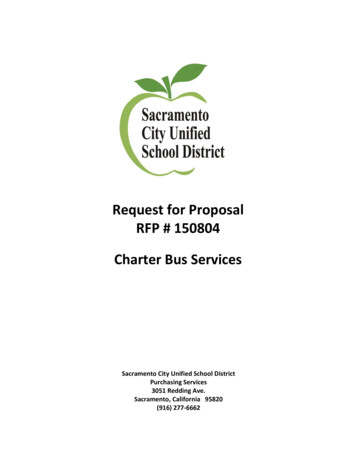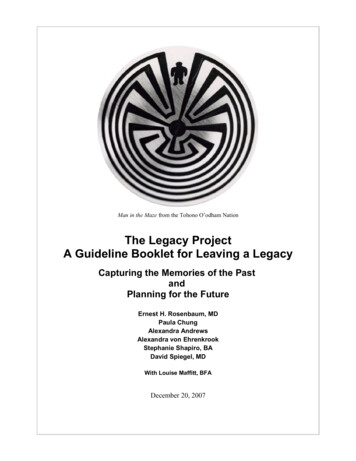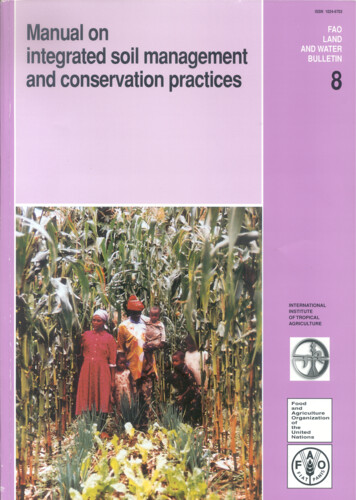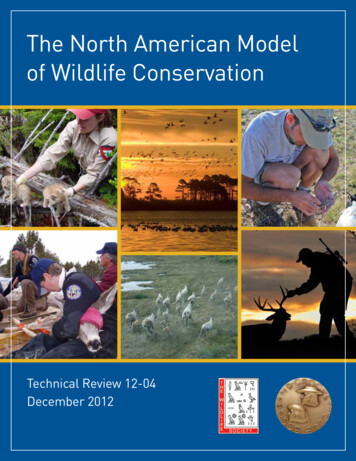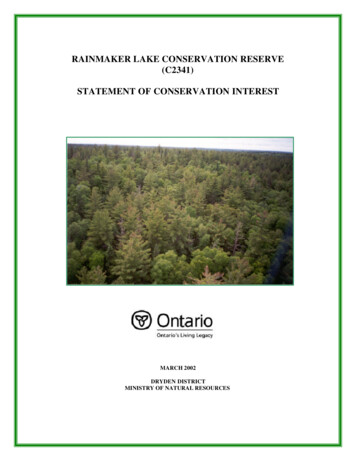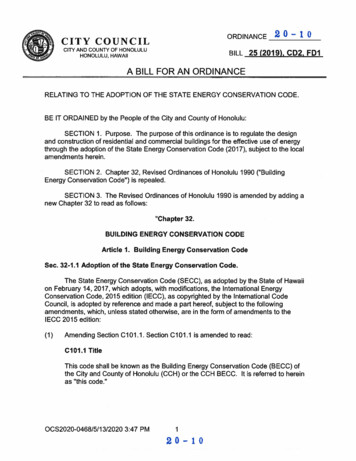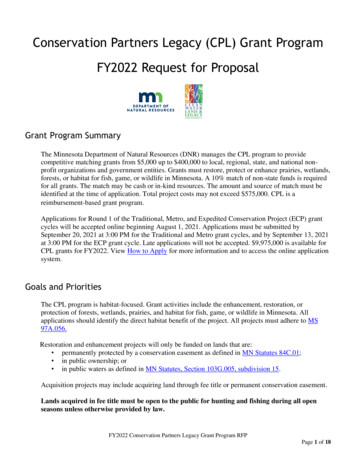
Transcription
Conservation Partners Legacy (CPL) Grant ProgramFY2022 Request for ProposalGrant Program SummaryThe Minnesota Department of Natural Resources (DNR) manages the CPL program to providecompetitive matching grants from 5,000 up to 400,000 to local, regional, state, and national nonprofit organizations and government entities. Grants must restore, protect or enhance prairies, wetlands,forests, or habitat for fish, game, or wildlife in Minnesota. A 10% match of non-state funds is requiredfor all grants. The match may be cash or in-kind resources. The amount and source of match must beidentified at the time of application. Total project costs may not exceed 575,000. CPL is areimbursement-based grant program.Applications for Round 1 of the Traditional, Metro, and Expedited Conservation Project (ECP) grantcycles will be accepted online beginning August 1, 2021. Applications must be submitted bySeptember 20, 2021 at 3:00 PM for the Traditional and Metro grant cycles, and by September 13, 2021at 3:00 PM for the ECP grant cycle. Late applications will not be accepted. 9,975,000 is available forCPL grants for FY2022. View How to Apply for more information and to access the online applicationsystem.Goals and PrioritiesThe CPL program is habitat-focused. Grant activities include the enhancement, restoration, orprotection of forests, wetlands, prairies, and habitat for fish, game, or wildlife in Minnesota. Allapplications should identify the direct habitat benefit of the project. All projects must adhere to MS97A.056.Restoration and enhancement projects will only be funded on lands that are: permanently protected by a conservation easement as defined in MN Statutes 84C.01; in public ownership; or in public waters as defined in MN Statutes, Section 103G.005, subdivision 15.Acquisition projects may include acquiring land through fee title or permanent conservation easement.Lands acquired in fee title must be open to the public for hunting and fishing during all openseasons unless otherwise provided by law.FY2022 Conservation Partners Legacy Grant Program RFPPage 1 of 18
CPL Funding and Grant CyclesFunding for the CPL grant program comes from the Outdoor Heritage Fund (OHF) created by thepeople of Minnesota. OHF receives 33 percent of the sales tax revenues resulting from the CleanWater, Land, and Legacy Constitutional Amendment passed by the voters in the November 2008election.For Fiscal Year 2022, a total of 10,450,000 was recommended by the Lessard-Sams Outdoor HeritageCouncil (LSOHC) to, and approved by, the 2021 Minnesota Legislature as ML 2021, First SpecialSession Ch.1, Art. 1, Section 2, Subd. 5(q), the Conservation Partners Legacy Grant Program Phase 13:Statewide and Metro Habitat. Of this amount, 9,975,000 is available for grants for the Traditionalgrant cycle, 3,250,000 is available for grants for the Metro grant cycle, and 2,400,000 is available forthe Expedited Conservation Projects (ECP) grant cycle.Traditional (Statewide): 5,175,000 Up to 2 funding cycles All eligible projects (restorations, enhancements, or acquisitions) on all eligible lands Grant requests between 5,000 and 400,000 Total project cost may not exceed 575,000Metro: 2,000,000 Up to 2 funding cycles Projects must be located within the 7- county metro area or within city limits of cities with apopulation of 50,000 or greater (Duluth, Rochester, St. Cloud) All eligible projects (restorations, enhancements, or acquisitions) on all eligible lands Grant requests between 5,000 and 400,000 Total project cost may not exceed 575,000Expedited Conservation Projects (ECP): 2,500,000 Grants are limited to a maximum award of 50,000 (minimum 5,000) Total project cost may not exceed 575,000 Projects must be on the ECP Activity List Restoration and enhancement projects only (no acquisitions) Metro Projects are guaranteed at least 400,000 of ECP funding Projects must be on public lands or waters Open continuously through May 9, 2022, or until funds run out, whichever comes firsto Completed applications will be pulled for review every two months on the followingdays at 3:00 pm: Round 1: September 13, 2021 Round 2: November 16, 2021 Round 3: January 17, 2022 Round 4: March 14, 2022 Round 5: May 9, 2022For the Traditional and Metro cycles, a simplified application is available for applicants requesting lessthan 25,000. Applicants should be sure to address all items in the Evaluation Criteria within thesimplified application.FY2022 Conservation Partners Legacy Grant Program RFPPage 2 of 18
If more than 1 million remains after the first Traditional and/or Metro grant rounds, a second grantround will be offered, beginning January 1, 2022, and closing February 21, 2021. If less than 1 millionremains, these funds will be available for the ECP grant cycle.The DNR reserves the right to: award less than the total amount available if suitable projects are not submitted; make additional awards under this announcement, consistent with DNR and Outdoor HeritageCouncil recommendations and guidance, if additional funding becomes available, a projectcomes in under or over budget, or if a grantee cannot carry out their project as planned; award amounts less than requested if not enough funding is available for the entire request; and award amounts less than that requested in an application should it be determined that aspects ofa project are not desirable, cost-effective, or eligible for funding.Eligible ApplicantsNonprofit organizations and government entities are eligible for CPL funding. Private individuals andfor-profit organizations may not apply. Partnerships are encouraged.State Grant Policy 08-13, Grant Closeout Evaluation, requires state agencies to consider a grantapplicant’s performance on prior grants from that agency before making a new grant award of over 5,000. Applicants who performed poorly on prior grants may not be funded, or may be only partiallyfunded until performance has improved.Application and Proposal RequirementsOnly complete applications will be accepted. Applications must include a signed Land ManagerReview and Approval Form. Applicants requesting over 25,000 must include financial information, asdescribed on page 8. A Public Waters Form is required for projects located in public waters.Match RequirementsThis program requires a 10% match of non-state funds. The match may be cash or in-kind resources.Funds used for match for CPL grants cannot be used as match for any other state grant programs.Match funds must be documented and reportable, and are subject to audit.The match amount is determined by multiplying the grant amount requested by 10%. Total Grant Requested ( ) x 0.10 Minimum Match RequiredCash Match is actual cash contributed to a project, either from the grantee organization or a thirdparty. The cash match must be used for a documentable cost of the project, as approved in the WorkPlan.In-kind Match is non-cash donations of a good or service, such as personnel time (paid staff),volunteer time, use of equipment, and donated supplies or services.PartnershipsApplicants are encouraged to combine contributions from non-state partners to meet the matchrequirement. One eligible applicant must lead the partnership effort and assume program and financialFY2022 Conservation Partners Legacy Grant Program RFPPage 3 of 18
responsibility for all work in the application. Successful applicants should be prepared to documentmatching contributions, including the number of volunteers and volunteer hours on individual projects.Match funds from partners must be supported with letters of commitment. A sample letter is availableon the How to Apply webpage. Letters of commitment should: be written on the contributing organization’s letterhead, identify the applicant and name of the project, identify the amount and source of funding they are committing, describe any time constraints or other contingencies with the funding commitment, and be signed by member(s) of the contributing organization with authority to commit theorganization to the match.Additional FundingSome large projects involve multiple funding sources that may not be eligible as match for this grant.Keep these amounts separate. There is an “Additional Funding” box in the application to list theadditional funding sources and amounts. Total project cost (grant match additional funds) cannotexceed 575,000. Projects exceeding 575,000 should apply directly to the Lessard-Sams OutdoorHeritage Council.Land ManagerThe Land Manager is the person who manages the land where the project is located. For acquisitions,the Land Manager is the person who will manage the land after purchase. For easements, the LandManager is whoever holds the easement. The Land Manager cannot be the same person as the ProjectManager. The Land Manager will be responsible for completing the Land Manager Review andApproval Form, which is required with each application.Project ManagerThe Project Manager is the person applying for the grant and responsible for the project. The ProjectManager cannot be the Land Manager. The Project Manager will be the main contact and must beactively involved and available to provide information during the application period and through thelife of the grant.The Project Manager must be affiliated with the grant recipient’s organization and be knowledgeableabout biological, partnership, and administrative aspects of the proposal. The Project Manager isresponsible for ensuring that all work is done according to grant and program requirements.The Project Manager coordinates work with the Land Manager, and is responsible for ordering andpurchasing supplies, writing and administering contracts, organizing and documenting volunteers,meeting permit requirements, etc. Some of these duties may be shared with the Fiscal Contact.Fiscal ContactThe Fiscal Contact works cooperatively with the Project Manager, but focuses on the fiscal side of thegrant. Specific duties are determined by the grantee’s organization, but generally include grant andmatch fund management, bill paying, submitting payment requests, etc. The Fiscal Contact willfrequently be included on emails and other communications between CPL Staff and grantees.FY2022 Conservation Partners Legacy Grant Program RFPPage 4 of 18
Natural Heritage Database ReviewThe Natural Heritage Database Review section must be completed on all Land Manager Review andApproval Forms in order for an application to be considered complete. If the Land Manager oreasement holder cannot access the Natural Heritage Database, they must contact CPL Grant Staff forassistance at least 10 days prior to the application deadline. CPL staff will complete the review freeof charge. The results of this review must be incorporated into the Land Manager Review and ApprovalForm. If there are any findings, these must also be addressed in the appropriate section of theapplication.State Historic Preservation ReviewIf CPL and DNR staff determine that a SHPO review is necessary, grantees are responsible for sendingproject information to SHPO. If SHPO determines that an archaeological survey should be completedon the project site before work begins, the grantee will be responsible for the survey and all surveycosts, which can be completed with grant funds. If you believe that your project may require anarchaeological survey in addition to the SHPO review, please add this into your budget. Most projectswill not require a survey. Please contact CPL grant staff if you have questions about this requirement.Eligible ExpensesEligible expenses are expenses (contracts, supplies and materials, salaries, etc.) directly incurredthrough project activities that are direct to and necessary for the project described in the application.These expenses must be specified in the application and documented during the grant period asindicated in the Payment Manual. Generally, if an expense is eligible as a grant cost, it is also eligibleas a match cost. Some costs have limits to the amount that will be paid from grant funds; any costsabove that amount may be eligible as match.All grant and match expenses must occur within the project period except for pre-award match costs,described below. The grant period begins when the final signature on the grant contract is obtained andcontinues until all work is completed but no later than June 30, 2025 for FY22 funds.Pre-award Match CostsPre-award costs are costs incurred before the grant agreement is executed. All pre-award costs areincurred at the applicant’s risk. Pre-award costs are only eligible for match, and must be identified inthe application’s budget:a. Insurance: Insurance costs for CPL projects are eligible only if incurred after the grantee hasbeen formally notified that they have been awarded a grant, but before the grant is in place.b. Appraisals: Appraisal fees that were incurred less than 12 months prior to the applicationdeadline are eligible match costs. The appraisal must be for the property specified in thegrant application, and must meet all requirements in the Land Acquisition Proceduresdocuments.c. Engineering and Design: Site specific engineering and design costs that were incurredwithin 18 months prior to the application deadline are eligible for match. Engineering anddesign documents must be submitted as uploads with the application in order to be usedtowards match.FY2022 Conservation Partners Legacy Grant Program RFPPage 5 of 18
Personnel and Grant AdministrationUp to 7.5% of the grant amount may be used for personnel costs for project management and on-theground work. Only paid employees of the grantee organization may claim personnel costs. All othersare considered volunteers and their time can be used only as in-kind match.Personnel rates include hourly wage and fringe only (FICA/Medicare, retirement, and healthinsurance). Bonuses, overhead, and other indirect costs cannot be included in the hourly rate. Proof ofwage is required. All personnel costs must be budgeted in the approved Work Plan. All personnel timemust be documented with the name of employee, date of work, hours worked, brief description ofwork, and hourly rate. Personnel costs beyond 7.5% of the grant may be used for match.TravelTransportation and travel expenses, such as lodging, meals, and mileage of personnel directly workingon the grant, are eligible expenses (grant or match) in the same manner and in no greater amount thanprovided for in the current Commissioner's Plan. Travel expenses shall not exceed 1 percent of the totalgrant funds requested, unless approved by CPL grant staff. Travel and subsistence expenses incurredoutside of Minnesota are not eligible expenses unless CPL staff has given written approval.Permitting and Environmental Compliance ExpensesCosts associated with permitting and compliance requirements should be listed within the AdditionalBudget Items line of the budget and explained in the details section. Grant or match funds can be usedto pay for these costs.Construction ProjectsAny projects requesting money for construction activities (water control structures, etc.) must havepreliminary engineering design and plans completed for the project prior to application submission.These plans are necessary to provide an accurate cost estimate and fully developed scope of work. Allplans must be submitted with the application. All design, engineering, survey costs, etc. may be used asmatch if completed within 18 months prior to the application deadline. For more information, see “PreAward Match Costs” on page 5.Acquisition CostsAcquisition costs such as appraisals, boundary surveys, legal fees, and initial development costs areeligible for reimbursement if planned for and approved in the Work Plan. Any obligation to purchaseproperty made before the grant contract is executed is made at the grantee’s risk. Acquisition costs forreimbursement and match may not exceed 110% of the appraised value. For more information onacquisition requirements, please see page 14.Donation of Value for AcquisitionsA donation of value means a landowner receives less than the appraised value of the land. Thedifference between the appraised value and the amount the landowner receives is considered a cashmatch donation towards the grant. The donation may be only part of the difference or the entireamount. Any difference between the amount paid to the seller and the appraised value must be reportedto CPL staff.Facility DevelopmentFacility development or improvement projects such as parking lots, roads, and hunter blinds are notconsidered habitat projects. Limited approval of these developments will be permitted only as part ofFY2022 Conservation Partners Legacy Grant Program RFPPage 6 of 18
the initial development of newly acquired lands. Public use facilities must have a minimal impact onhabitat on acquired lands. For more information on Initial Development Plans, please see page 15.Ineligible ExpensesIndirect costs (overhead costs for basic operational functions such as lights, office rent, water, phone)are not eligible grant or match expenditures. Below are some common requests for funding that theCPL program will NOT fund with grant dollars or allow as match (unless specified). These requestswill be removed from any application prior to review and may result in the rejection of the entireapplication. Work on project sites not identified in the Work Plan or approved by CPL staff. Engineering and Design Costs*. Grant funds may not be used to pay for engineering and designcosts for any activity. Engineering and design work must be substantially complete beforerequesting grant funds for a project. CPL staff may request engineering and design plans fromapplicants during the review process to validate cost estimates and ensure the project will becompleted within the allowed timeline. *These costs may be used for Pre-Award Match ifincurred within 18 months prior to the application submission date. See page 5. Research, education, interpretive signs, or planning activities Capital Equipment including but not limited to vehicles, trailers, chainsaws, sprayers, etc. Acquisition of land that is owned by the state or a political subdivision of the state. Activities on conservation easements that are the responsibilities of landowners under the termsof the easement.Application InformationAll applications must be submitted online(https://webapps15.dnr.state.mn.us/cpl grant applications/authentication/login). Organizations maysubmit multiple applications; however, it is helpful to indicate in the application summary whichproject is the highest priority.Dates and DeadlinesApplications for Round 1 of the Traditional and Metro grant cycle will be accepted from August 1 untilSeptember 20, 2021 at 3:00 PM, CST. Grants will be selected by December 31, 2021. If fundingremains, Round 2 will open on January 1, 2022 and close on February 21, 2022 at 3:00 PM, CST.Grants will be selected by May 9, 2022.See the Application and Funding Schedule for a list of ECP dates and deadlines.Application StatusThe DNR will notify all applicants of their status via email by December 31, 2021 for the first round ofgrants and by May 9, 2022 for the second round of grants, if applicable. This notification is not anauthorization to begin work.ECP applicants will be notified within 4 to 6 weeks of the deadline for the round in which they applied.FY2022 Conservation Partners Legacy Grant Program RFPPage 7 of 18
Online Application SystemAll application information, including the required and optional forms, instructions, and the applicationsystem link can be found on the Traditional, Metro, ECP, or How to Apply webpages. All grantapplications must be submitted using the online application system. Applicants must create an accountand password the first time they access the system. The system allows applicants to save theirapplication and return to it as many times as needed before submitting. Once as application issubmitted, only CPL staff will be able to make changes.Completing the Application Applications must have a project manager, land manager, and a fiscal contact. The projectmanager and fiscal contact may be the same person, but neither can also be the Land Manager. A valid email address for the project manager and fiscal contact is required. Most initialcorrespondence with CPL staff will be by email. Financial documentation must be submitted for nongovernmental organizations requesting over 25,000 (see page 8). Each project site must be mapped using the online mapping system. Each applicant must submit a completed Land Manager Review and Approval Form, includingthe Natural Heritage Database Review section, signed by the Land Manager or EasementHolder and uploaded electronically to the application. For work on private lands, the permanent conservation easement must be uploaded. Projects occurring within public waters must submit a Public Waters Project Form in addition tothe Land Manager Review and Approval Form. This form should be completed and signed bythe DNR Area Hydrologist. Call CPL Grant Staff with any questions and for any clarifications. Applicants planning to workin public waters should review Requirements for Projects Involving Public Waters WorkPermits and Do I need a Permit? prior to applying for funding.Applicants are responsible for the content of their application. It is the applicant’s responsibility toensure that all forms are completed, signed and uploaded. Applications with missing or incompleteforms will not be accepted.Applicants must click on the “submit application” button to submit their application. Once submitted,no changes can be made by the applicant. CPL staff may be able to help with minor changes.Application Review ProcessEvaluation Criteria and ScoringThe Evaluation Criteria used to evaluate grant applications has been developed by the MNLegislature, LSOHC, Office of Grants Management, and CPL Staff. Applicants should review theEvaluation Criteria Table found at the end of this document to make sure all the information neededto fully evaluate their application is included in their applications. Traditional and Metro applicationswill be scored on all six criteria found in the table, with equal weight given to each of the sixcategories. ECP applications will be reviewed with the criteria in mind, but will not be given a score.Initial ReviewCPL staff will review all applications for completeness and eligibility. If submitted prior to thedeadline, CPL staff may have a chance to contact applicants for missing information.FY2022 Conservation Partners Legacy Grant Program RFPPage 8 of 18
Financial Review of Nongovernmental OrganizationsNongovernmental organizations requesting over 25,000 are required to submit financialdocumentation to meet the State Grant Policy 08-06, Financial Review of NongovernmentalOrganizations. The application system will prompt the user for this information, which will bereviewed by CPL staff. Required documentation is based on annual income:a. Less than 50,000 - most recent board-reviewed financial statements.b. 50,000- 749,999 - most recent IRS Form 990.c. 750,000 and up- most recent certified financial audit.Technical Review for Traditional and Metro grant cyclesTechnical review of applications will be performed by a Technical Review Committee (TRC) and byDNR Regional Directors. TRC committees include habitat experts from both nonprofit organizationsand government agencies including DNR, BWSR, the US Fish and Wildlife Service, the US ForestService, local governments, and universities. The TRC will score each application based on theEvaluation Criteria. Based on these scores, the TRC will provide a funding recommendation rankingfor DNR Division Directors Review.Division Director Review for Traditional and Metro grant cycleThe Division Directors of DNR Fish and Wildlife, Ecological and Water Resources, and Forestry willreview the applications and make a final recommendation to the DNR Commissioner based on thefollowing: TRC scores, comments, and recommendations, DNR Regional Director comments, public agency’s ability and/or readiness to support proposed project activities, applicants ability to successfully complete work, and geographical distribution of funding.Final ApprovalThe Commissioner of the Department of Natural Resources must give final approval as to whichprojects to fund, based on all information provided by the Technical Review Committee(s), RegionalManagers and Division Directors. The DNR reserves the right to reject any and all applications whichdo not meet the requirements of this RFP or are outside the scope of the Conservation Partners LegacyGrant Program.ECP grant cycle reviewECP applications will be reviewed by DNR habitat experts using the Evaluation Criteria as thefoundation for a pass/fail decision. The Commissioner has granted approval authority for the ECPgrants to the DNR’s Fish and Wildlife Division Director. The DNR reserves the right to reject any andall applications which do not meet the requirements of this RFP or are outside the scope of theConservation Partners Legacy Grant Program.Unfunded ApplicationsUnfunded applicants will be notified of their status at the time the awards are announced. Applicantswho are not awarded funding may ask for their applications to be reactivated, which will make themeditable again should funding remain for a second grant round. Applications will then need to beresubmitted after editing to be considered for the next grant round.FY2022 Conservation Partners Legacy Grant Program RFPPage 9 of 18
Unawarded FundsIf more than 1 million remains after the first Traditional and Metro grant rounds, a second grant roundwill be offered. If less than 1 million remains after the first grant round, these funds will be availablefor the ECP grant cycle.Any unawarded funds after Round 2 will be available for the ECP grant cycle. Any unawarded fundingfrom ECP after the 5th funding round in May, 2022, will be rolled into available funds for FY23 CPLgrants.Award InformationRound 1 of Traditional and Metro grants is expected to be announced by December 31, 2021.Round 2 of Traditional and Metro grants is expected to be announced by May 9, 2022.Grant Award InformationSuccessful applicants will be notified via email. All grants will be awarded using a grant contract. Thegrant contract is the legal document between the award recipient (grantee) and the State of MN. Uponrequest by CPL staff, grantees will need to submit an insurance certificate, conflict of interest form,CCM contact email, and Work Plan approval. Once these items are submitted, CPL staff will set up thegrant contract. CPL staff will provide further instructions to grantees after the initial award notification.Work PlanThe awarded grant application will become the Work Plan, which is incorporated into the grantcontract. The grantee will have a chance to review their application for any minor changes before itbecomes their official Work Plan. Once the grant contract is executed, project changes may need aformal amendment. Any changes made to the Work Plan without CPL staff approval may result in notbeing reimbursed for expenses related to those changes.Executing the Grant ContractGrantees will need to register with the state vendor system before they can enter into a grant contractwith the State. A federal tax identification number is required to register. Once the grantee has a stateVendor ID number, CPL staff may begin to set up their contract. Grant contracts require a minimum ofthree signatures, signed in this order:1. State Encumbrance Verification by a DNR staff member2. Grantee Signature by the member(s) of the grantees’ organization who have the authority tosign legal documents on behalf of the organization.3. State Agency signature by a DNR Division Director or other staff with delegated authority toapprove the grant and expenditure of state funds.The grant contract is “executed” when all the above signatures have been obtained. Work may notbegin until the grant contract is executed. Once the grant contract is executed, no changes may be madewithout approval from CPL staff. CPL staff may grant permission for minor changes, but most changeswill require a formal grant contract amendment.Grant PeriodThe grant period starts when the grant contract is “executed,” meaning all required signatures havebeen obtained, and typically lasts 3 to 3 ½ years. The end date is determined by the appropriationlanguage. Projects funded with FY22 funds must be completed by June 30, 2025. Any work occurringFY2022 Conservation Partners Legacy Grant Program RFPPage 10 of 18
outside of the grant period is not eligible for reimbursement and cannot be used as match, except forthe exceptions listed under “pre-award match costs.” Grant period extensions are not allowed.PaymentsGrantees will be paid on a reimbursement basis. Organizations with limited cash flow may requestpayment for services rendered upon approval from CPL staff. Advance payments may be provided foracquisitions if requested 30 days prior to the scheduled closing. Shorter time periods may beaccommodated, but cannot be guaranteed. Five percent of every grant (including advance acquisitionpayments) will be held back until the project is completed and a Final Report has been submitted. StateGrant Policy 08-08, Grant Payments has more information on grant payment methods, schedules, andother payment information. Please also see the CPL Payment Manual.Timeline for ReimbursementThe state has up to 30 days to process payment requests once all required documentation is received.The fastest way to receive payments is by signing up for Electronic Funds Transfers (EFT) using a statevendor number. This system allows grantees to review their payment information online.Grant Outcome Expectations and Reporting RequirementsEcological Rest
Manager is whoever holds the easement. The Land Manager cannot be the same person as the Project Manager. The Land Manager will be responsible for completing the Land Manager Review and Approval Form, which is required with each application. Project Manager . The Project Manager is the person applying for the grant and responsible for the project.
